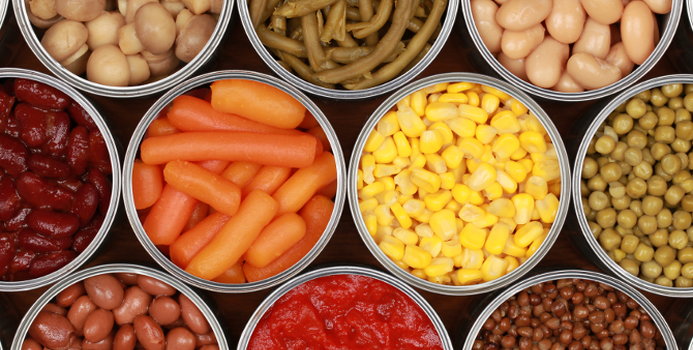Foods that are high in sodium contribute to high blood pressure and other health problems like high cholesterol and even diabetes. The consistent intake of too much sodium can also put you at risk for heart disease and strokes. The American Heart Association says you should aim for no more than 1500 milligrams of sodium a day.
Foods that are high in salt tend to make the body hold on to extra water in an effort to balance out the sodium in your body. This can make it hard to lose weight. There are a number of foods that should be eaten in moderation or should be avoided all together if you are trying to limit your sodium intake:
Canned Soup
Even varieties that claim to have reduced sodium can harbor too much salt. Even vegetable soups can contain more than an entire day's worth of salt in just one serving. Look for varieties that have less than 400 milligrams of sodium per serving.
Canned Vegetables
Salt is added to canned vegetables in an attempt to keep them fresh longer. Fresh and frozen vegetables are a better option. If you have to used canned vegetables, look for organic, low- and no-sodium versions.
Spaghetti and Tomato Sauce
Canned or jarred, it doesn't matter. Most varieties you find in the grocery store are loaded with sodium. This fact shouldn't be overlooked just because the product claims to offer a full serving of vegetables. Eating no vegetables at all is better than consuming enough sodium in one sitting to last you a couple days.
Macaroni and Cheese
One serving of macaroni and cheese gives you over 1000 milligrams of sodium, almost as much as most people should have in a day. Chances are that you won't have a problem exceeding your recommended sodium intake for a day when macaroni and cheese is on your menu.
Barbecue Sauce
Not only are many barbecue sauces filled with sodium, but they usually contain high-fructose corn syrup and other processed ingredients that make the sauce simply not worth eating. When used in moderation, it's fine. Most of the time, however, barbecue sauce is used when cooking meat and is usually slathered onto the product. This can result in consuming multiple servings at a time, upping the sodium intake in the process.
Many favorites that make putting meals together for the family easy are on this list, but don't let that depress you. Instead, consider making some of this stuff at home. You can make big pots of soup and freeze it for when it's needed, and the same goes for barbecue sauce and ketchup. If you don't have the time, consider checking natural food stores and looking for organic and low-sodium products in the market. The best thing you can do is to avoid processed foods and choose other options such as fresh fruits, vegetables and whole grains.



